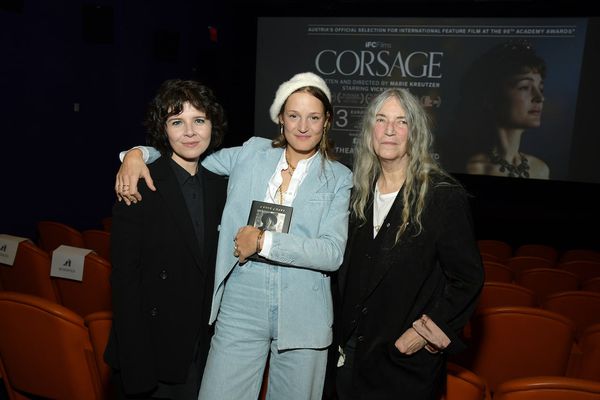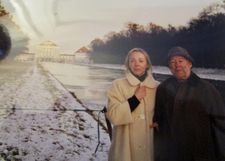In the second instalment with Marie Kreutzer, we discuss Sisi (Vicky Krieps, Best Actress winner at the European Film Awards and Cannes Film Festival) with King Ludwig II of Bavaria (Manuel Rubey), Louis Le Prince played by Finnegan Oldfield, and the chocolate scene in Corsage, Luchino Visconti’s Ludwig (starring Romy Schneider as Empress Elisabeth of Austria, Helmut Berger as King Ludwig II, Trevor Howard as Richard Wagner, and Silvana Mangano as Cosima von Bülow), riding in the dark, how biographies speak of their own time, undefinable friendships with men, the representational, the functional, and the omnipresence of golden chairs.
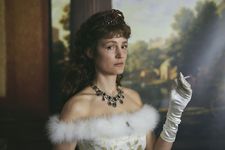 |
| Vicky Krieps as Empress Elisabeth of Austria in Corsage Photo: Felix Vratny, courtesy of IFC Films |
Last week Patti Smith hosted a screening of Corsage (Best Film at the London Film Festival), attended by Sarita Choudhury, Hailey Gates, Annie Leibovitz, Piper Perabo, Dolly Wells, Sunita Mani, Diana Silvers, Olivia Luccardi, Bree Elrod, Marie Kreutzer, and Vicky Krieps (seen in Mathieu Amalric’s Hold Me Tight) at the Crosby Street Hotel.
What is it about Empress Elisabeth of Austria that makes her so inexhaustibly fascinating? The answers are many. Born a Bavarian duchess from the House of Wittelsbach on Christmas Eve 1837 and assassinated at age 60 in Geneva by an anarchist - her life has been a very full and extraordinary one.
Sisi’s role in establishing the K&K dual monarchy of Austria-Hungary in 1867, her distinct and often extreme fitness and diet regime, the Rapunzel-like hair, the extensive travels, what happened with her son at Mayerling, the bond with her cousin, the “mad” swan king Ludwig II (whose castle to this day shines from many a Disney logo) - all this has been floating in public consciousness in waves of popularity.
There are the famous midcentury Sissi films (with double s, though the real Sisi preferred one) with Romy Schneider which are in the German speaking world the equivalent of The Wizard Of Oz or It’s A Wonderful Life as holiday treats. A recent boom of rediscovery portrays her in various TV series, In László Nemes’s excellent 2019 movie Sunset (Napszállta) she is a haunting presence in absence, and Frauke Finsterwalder’s Sisi & I (screenplay with Christian Kracht, starring Sandra Hüller and Susanne Wolff as Sisi) is scheduled to be released next year.
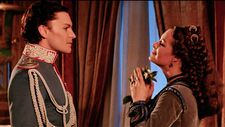 |
| King Ludwig II (Helmut Berger) with Empress Elisabeth of Austria (Romy Schneider) in Luchino Visconti’s Ludwig |
It is December 1877, “At 40 a person dissolves,” Sisi (Krieps) says and her husband Emperor Franz Joseph I (Florian Teichtmeister) as well as the painter hired for her final official portrait keep shooting arrows at her self-confidence about her weight and complexion in Kreutzer’s Corsage. Her visit to hospitals and especially a women’s ward for the insane comfort her and as she distributes neatly wrapped purple parcels of candied violets to patients, she also initiates the installation of modern bathrooms for the institution. The veil on her face is a finely-spun sibling to the netting around the “melancholic” women’s beds. What was the reason a particularly despondent woman was brought to the asylum for treatment, the monarch inquires. “Adultery” is the bombshell response.
In May 1878 she escapes to visit cousin Ludwig II, and they resume the way they played together as children. His castles are crumbling around the chandeliers and so are his teeth from the many sweets he consumes. In a particularly powerful scene, he pours liquid chocolate into Sisi’s mouth. We had seen her eat nothing more than thinly sliced oranges and broth up to this point, and the overflowing “comforting” pitch-black lava coming out of her mouth feels like a final eruption of the hell she held deep inside. Krieps’s laugh at that moment is perfect. The cousins swim in Lake Starnberg at night and speak of death. “You can’t drown in my lake,” he says to her, “It’s my lake.”
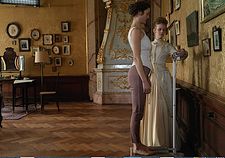 |
| Sisi (Vicky Krieps) being weighed in by Ida Ferenczy (Jeanne Werner), her lady-in-waiting Photo: IFC Films |
The invented scenes in England between Sisi and Finnegan Oldfield as Louis Le Prince (who sports an earring) are lovely and provide great context of the times. Sometimes she sticks out her tongue or uses language she probably wouldn’t have used in the 19th century, which feels eager to get young audiences to relate, although it is already very clear how much her story resonates today.
From New York City, Marie Kreutzer joined me on Zoom for an in-depth conversation on Corsage following the 60th New York Film Festival, before the Oscar shortlist was announced.
Anne-Katrin Titze: “Darkness is protection” is a line connected to the scenes with Ludwig. Of course I had to think about Visconti’s Ludwig, all that riding in the dark. For Corsage it must have been difficult to decide what to show about the interaction between Sisi and Ludwig. How was that decision process?
Marie Kreutzer: It was kind of interesting when I was reading the biographies. When you’re reading a biography from the 1990s, the interpretation is that they had a very close relationship and they had a lot of things in common and were both very special people, a little bit different from others. Now when you read a biography from the 1950s or 60s, you read about a mentally ill cousin whom she didn’t like and didn’t want to be seen with.
AKT: Yes, perspective!
MK: So it’s very much an interpretation and you can make of it what you want. To be honest, I kind of remembered friendships I had when I was about 18 or 20. Friendships with men that would be friendships but there’s always some tension and you wouldn’t know where it would lead. And you would enjoy that moment of not knowing, of playfulness.
A feeling of connection without necessarily walking towards a love relationship. It had to do with that, I think. That’s how I could imagine their relationship, like it was never seriously about sexual tension, I think, but just feeling so close to someone and then also having to find an expression for that. Because it’s not what you’d expect for a woman to be so close to a man. I thought it was beautiful to give her a connection to a man that was not necessarily a sexual connection, but one impossible to name.
AKT: And one remaining undefined.
MK: Yeah, that’s why it’s also possible for her to project a lot onto him and to have her own interpretations at some point of the story. She thinks that he might be the one to really understand her. And then in the end he is also just seeing what he wants to see. And just taking that part of her that he loves.
AKT: Yes, the night rides and swims and what he is focusing on. It’s also great what you do with food. You give him beer and cake and pastries at breakfast while she has tea with lemon. Then there is of course the scene with the liquid chocolate. It reflects everything that has been repressed and resembles pitch. I had to think of the Pech-Marie (a girl rewarded with pitch in the fairy tale Mother Holle) - and it’s your name too! Maybe that’s why. It just came to my mind.
MK: Ha, really?
AKT: But the whole scene stands and falls with Vicky’s laugh. As a reaction to this pretty violent act, she laughs and it is in a way the greatest relief we get in the film. How did that scene come about?
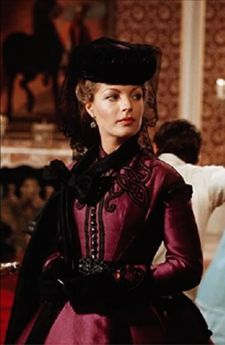 |
| Romy Schneider as Empress Elisabeth (Piero Tosi received a Best Costume Design Oscar nomination) |
MK: It was in the script. It goes even further with whipped cream but we didn’t use it in the film, it became too much. It then became ridiculous at some point. It was a classic late in, early out editing situation, which made it work then. It came from me reading that he loved food so much, especially sweet food.
That’s also why he had the bad teeth, because he obviously had really bad teeth. And he became quite fat later in his life because of all the sugary stuff he always ate. And I thought that was such a big difference from her, always restricting herself. I just kind of had to use it. It’s him showing her a sensual world.
AKT: An overflow?
MK: Yes, just, you don’t always have to restrict yourself and be perfect and control yourself all the time. I think that’s what he’s there for as a character, to show her you can also let go of the control. You might as well let go of that. I mean, of course she couldn’t.
He’s a man, he’s a king, he can do whatever he wants. I mean, he can’t then in history, but at this point in his life he still can. It’s also part of the disappointment because she doesn’t have the same freedom. But at that point she kind of glimpses that possible freedom.
AKT: Finnegan Oldfield’s character and the moving images he produces are a nice cracked mirror of what we don’t have. There are no actual moving pictures of Sisi. We all make them ourselves. It’s a lovely idea. Was it also something that came to you early on in the script?
MK: Yes, I remember reading about him [Louis Le Prince] for the first time and thinking why have I never heard about him? I mean, I studied film, had film history lessons, but I never heard about the guy.
And I was just curious and thought he was a great character. It was interesting what then happened to him and also spooky. I can’t remember how he came into the script, I can speak easier about what happens when we’re shooting because we’re all together, but when I’m writing on my own with my music and my ideas, often I don’t know how it happens. But I thought it was just a beautiful idea to give her the possibility of another image of herself. One that she could be a part of creating.
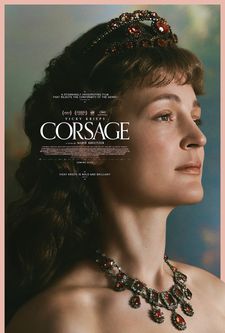 |
| Corsage poster |
AKT: The sets tell us the Empire is crumbling. I particularly liked the corridors. That the corridors between the couple [Sisi and Emperor Franz Joseph] are the places that are blank, as if there’s nothing between them. They have to go through limbo, through this empty channel to get to each other.
MK: For me it was essentially creating “backstage areas.” Because the idea was also for the corset. The corset had to look very functional. The idea was that everything the audience, the public wouldn’t see, would not be representational. It would just be functional. In the end an empire has the job to show people power and wealth and that we know what we are doing here and show them all the beauty and elegance.
But behind that there were hundreds, I think actually 2000 people in that Hofburg, keeping it all up. I wanted to show that a little, that it also is like a factory, really. It’s keeping it going, the whole Empire thing. That was important to me to show the functionality.
For example the golden chairs in the hallway, that was something I saw in every castle I visited. Because you can rent most of these castles for events and they all have these chairs stacked somewhere. And I said to my production designer “we have to do this too.” It tells exactly this: We’re always ready for representation, but just for the people from outside.
Read what Vicky Krieps had to say on Corsage and Margarethe von Trotta’s Bachmann & Frisch.
Read what Marie Kreutzer had to say on her use of Camille’s song, She Was, her work with costume designer Monika Buttinger, hair designer Helen Lang, makeup artist Maike Heinlein, production designer Martin Reiter, her screenplay, Jacques Lacan, control, numbers and measurements.
Corsage will open in cinemas in the US on Friday, December 23 and on December 30 in the UK.








